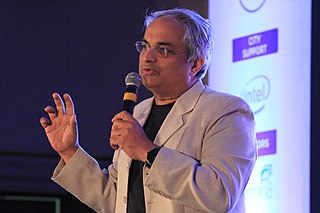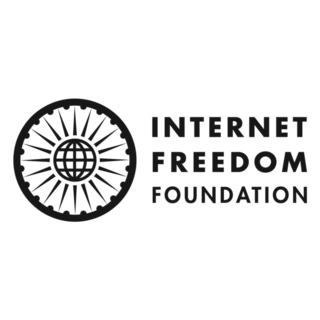India's telecommunication network is the second largest in the world by number of telephone users with 114.8 crore subscribers as on 07 February 2024. It has one of the lowest call tariffs in the world enabled by mega telecom operators and hyper-competition among them. India has the world's second-largest Internet user-base with 747.41 million broadband internet subscribers.

Internet censorship in India is done by both central and state governments. DNS filtering and educating service users in suggested usages is an active strategy and government policy to regulate and block access to Internet content on a large scale. Measures for removing content at the request of content creators through court orders have also become more common in recent years. Initiating a mass surveillance government project like Golden Shield Project is an alternative that has been discussed over the years by government bodies.

Bharti Airtel Limited, commonly known as Airtel, is an Indian multinational telecommunications services company based in New Delhi. It operates in 18 countries across South Asia and Africa, as well as the Channel Islands. Currently, Airtel provides 5G, 4G and LTE Advanced services throughout India. Currently offered services include fixed-line broadband, and voice services depending upon the country of operation. Airtel had also rolled out its Voice over LTE (VoLTE) technology across all Indian telecom circles. It is the second largest mobile network operator in India and the second largest mobile network operator in the world. Airtel was named India's 2nd most valuable brand in the first ever Brandz ranking by Millward Brown and WPP plc.

BSNL Mobile is an Indian state-owned telecommunication company of the Government of India. BSNL Mobile operates under the BSNL brand and provides wireless cellular services to B2B, B2C, & B2G segments in India. BSNL Mobile has a pan-India presence with presence in all the 22 telecom circles in India.
Aircel Ltd. was an Indian mobile network operator headquartered in Mumbai that offered voice and 2G and 3G data services. Maxis Communications held a 74% stake and Sindya Securities and Investments held the remaining 26%. Aircel was founded by Chinnakannan Sivasankaran and commenced operations in Tamil Nadu in 1999. It was once a market leader in Tamil Nadu and had considerable presence in Odisha, Assam and North-East telecom circles. 2G and 3G Services including voice were shut down in all circles after failure of merger talks with Reliance Communications.
Mouthshut.com is a consumer review and rating platform founded in 2000 by Faisal Farooqui. The company hosts reviews and ratings written by users, on more than 800,000 products and services available in India. In 2012, the company actively petitioned against Section 66A of the Indian IT Act and the Intermediary Guideline Rules, leading to their eventual scrapping and reading down by the Supreme Court of India. The site has reviews across 400+ categories.

Internet in India began in 1986 and was initially available only to the educational and research community. General public access to the internet in India began on 15 August 1995. American multinational digital communications technology conglomerate Cisco estimated that India will have more than 900 million Internet users by 2023.

Spice Digital Limited is an Indian telecommunications company headquartered in Noida, India, as a subsidiary of Spice Connect. The company deals in Mobile Value Added Services, along with Telco Solutions, enterprise solutions, financial technology, GST Suvidha Provider (GSP) and digital transformation products and services.
Cellcast Group is a broadcasting company based in the United Kingdom. They operate channels on the Sky UK, Virgin Media, YouTube, Freesat and Freeview TV platforms in the UK and internationally via paid programming which consist of participatory television programming such as phone-ins, teleshopping and quiz channels. They are also a provider of software development services for the media industry such as second screen application development, production of digital on screen graphics, mobile gaming development, direct carrier billing and internet marketing.
Direct-to-Home (DTH) television is a method of receiving satellite television by means of signals transmitted from direct-broadcast satellites. The Government of India (GoI) permitted the reception and distribution of satellite television signals in November 2000. The first DTH service in the country was launched by Dish TV on 2 October 2003. DD Free Dish, the first free DTH service in India, was launched by public broadcaster Prasar Bharati in December 2004.
Wikipedia Zero was a project by the Wikimedia Foundation to provide access to Wikipedia free of charge on mobile phones via zero-rating, particularly in developing markets. The objective of the program was to facilitate access to free knowledge for low-income pupils and students, by means of waiving the network traffic cost. With 97 operators in over 72 countries, it was estimated that access to Wikipedia was provided to more than 800 million people through the program. The program ended in 2018.
Internet.org is a partnership between social networking services company Meta Platforms and six companies that plans to bring affordable access to selected Internet services to less developed countries by increasing efficiency, and facilitating the development of new business models around the provision of Internet access. The app delivering these services was renamed Free Basics in September 2015. As of April 2018, 100 million people were using internet.org.
Facebook Zero is an initiative undertaken by social networking service company Facebook in collaboration with mobile phone-based Internet providers, whereby the providers waive data (bandwidth) charges for accessing Facebook on phones via a stripped-down text-only version of its mobile website. The stripped-down version is available online only through providers who have entered the agreement with Facebook. Photos are not loaded by default. Users may still choose to view them by clicking through but regular data charges apply to photo use.
Mechanisms for establishing rules ensuring Net neutrality in India, are at present mainly enforced by the Telecom Regulatory Authority of India (TRAI). At present, there are no specific legislation regarding Net Neutrality in India.
Airtel Zero was a platform launched on 6 April 2015 in India by Bharti Airtel, a multinational telecommunications service company across South Asia and, at the time, the largest cellular service provider in India, with 192.22 million subscribers. As per reports, Airtel Zero was a platform through which Airtel would have offered users free access to certain mobile applications and services from companies who had signed up with Airtel.

Mahesh Murthy is an Indian marketer, entrepreneur, and investor. He is the founder of the digital agency Pinstorm.
Net neutrality is the principle that governments should mandate Internet service providers to treat all data on the Internet the same, and not discriminate or charge differently by user, content, website, platform, application, type of attached equipment, or method of communication. For instance, under these principles, internet service providers are unable to intentionally block, slow down or charge money for specific websites and online content.

Internet Freedom Foundation (IFF) is an Indian digital rights organisation that advances liberty, equality, fraternity and social justice in the digital age. IFF has three verticals of work that include strategic litigation, policy engagement and civic literacy.

Faisal Farooqui is an Indian technology entrepreneur and the founder and CEO of the review and rating platform MouthShut.com.







